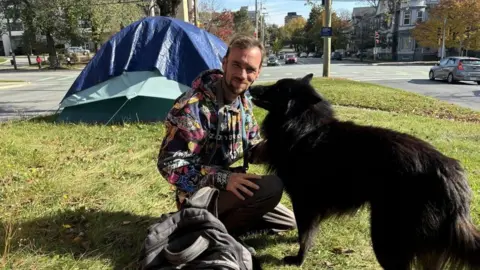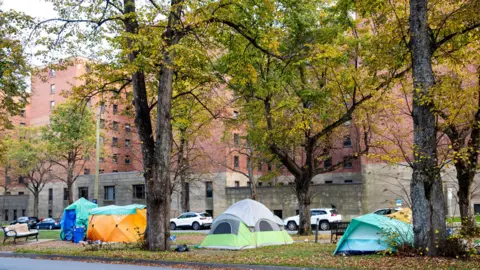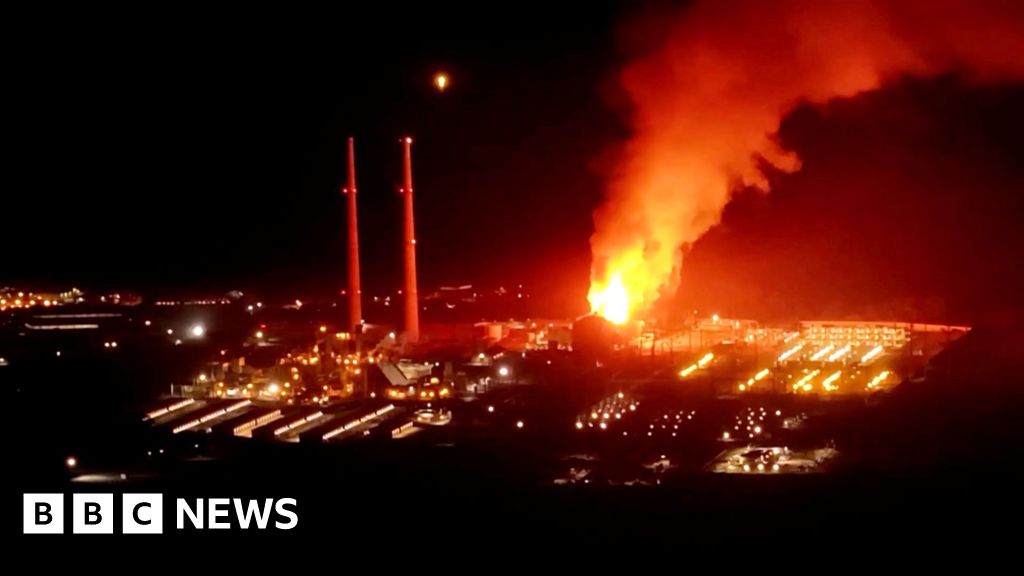ARTICLE AD BOX

 BBC
BBC
Encampment residents like Andrew Goodsell say Halifax's skyrocketing rent has made housing unaffordable for many
As cities across North America grapple with homelessness, one Canadian city has taken a different approach by regulating tent encampments instead of banning them, as it tries to tackle what one official calls the issue "of the decade".
Andrew Goodsell has called his small orange tent on a grassy patch in downtown Halifax home for almost a year.
In late October, on a park bench outside his makeshift dwelling, the 38-year-old described life at the homeless encampment where he lives with about a dozen or so others as “depressing”.
“I wake up in an area I don’t want to be,” Mr Goodsell said, as a stream of cars drove by.
“I’d much rather wake up in a spot where I could take a shower and maybe make myself something to eat. But I’ll still get myself out of bed.”
Mr Goodsell has been without a home on-and-off for a decade.
He once got by with couch surfing or working minimum-wage jobs to pay rent, but with Halifax’s skyrocketing housing costs, he can no longer afford a place to live.
His encampment is one of nine sites chosen by the city as a place where people without housing can lawfully camp outside. The sites were approved this summer as a temporary, but some argue necessary, solution while indoor shelters are at-capacity.
The policy has been adopted by at least one other municipality in Canada and is being considered by others who too are facing a rise in homelessness.
It's in stark contrast to other North American cities where police officers forcibly remove homeless encampments. These so-called "street sweeps" have been criticised as violent and ineffective in addressing the housing crisis.
But they have become increasingly popular as homelessness has grown since the pandemic. California has cleared more than 12,000 encampments since 2021, while cities like Fresno, California and Grants Pass, Oregon have passed complete bans on camping in public spaces.
Proponents of banning encampments say that the campsites lead to disorder, and that funding should go to getting people off the streets.
Among detractors of Halifax's approach are some encampment residents themselves, who say they want resources spent on affordable housing instead.
“Canada is one of the richest, most beautiful countries around,” Mr Goodsell said. “We have so much land, so much resource, but we must be one of the greediest countries out there.”

 Kelly Clark/BBC
Kelly Clark/BBC
Halifax made encampments lawful as a temporary measure to tackle its growing housing crisis
Although several Canadian cities, including Halifax, have tried to remove homeless encampments in the past, recent court decisions in British Columbia and Ontario have ruled that people without homes can camp outside if there are no appropriate indoor shelters available.
In contrast, the US Supreme Court ruled in June that cities can fine and arrest homeless people, even if there is no shelter for them to go to, paving the way for the outright bans on encampments in California and Oregon.
Another difference is the growing recognition in Canada that previous approaches have failed, says Stepan Wood, a law professor at the University of British Columbia, who has studied the issue.
“The approach up until a couple years ago had been to clear them out, but it’s now no longer deniable that that doesn’t solve the problem,” he told the BBC.
Canada's national database estimates that there are 235,000 homeless people across the country in a given year, though experts argue that number is higher.
This figure puts the rate of homelessness in Canada above that of the US and England, according to a comparison of official data. Globally, many cities have seen a rise in homelessness since the pandemic.
In 2018, Halifax - the largest city on Canada’s Atlantic Coast with a population of around 518,000 - only had 18 people sleeping rough, said Max Chauvin, the director of housing and homelessness in Halifax. Now it's over 200.
While Halifax has approved nine designated encampment sites, only five are operating. Each has a proposed limit of up to a dozen tents, but most are over capacity.
The city provides the sites with portable toilets, while outreach workers come by weekly to drop off bottled water and check in on people, encampment residents told the BBC.
Sometimes they will bring things that residents need, like a coat, or a warmer sleeping bag for the winter.
Mr Chauvin said the designated encampments are born out of a realisation that the city has run out of options to immediately address its housing crisis.
The city is waiting for the provincial government to ramp up affordable housing construction. Nova Scotia has not built any new public housing units since 1995.
In the meantime, “the question becomes: 'Where are people going to go?'” Mr Chauvin said.
He believes solving the housing crisis will be “the item of the decade” for his city and others.
“One of the largest groups of homelessness we see growing is simply people who don't have enough money to pay rent, and that’s new,” he said, adding that includes seniors, students, and entire families.
Mr Chauvin also points to a lack of accessible healthcare for people with mental and physical illnesses.

 Kelly Clark/BBC
Kelly Clark/BBC
Samantha Nickerson is one encampment resident who has received temporary indoor shelter
Proponents of the designated sites say they prevent the criminalisation of people who are homeless and allow the city to concentrate its outreach services.
Still, Halifax's policy is both provisional and divisive.
It was a focal point of the city’s October mayoral election, where the winner promised to end the expansion of designated encampments and to remove unlawful ones.
Trish Purdy, a city councillor, unsuccessfully fought to remove a proposed designated site in her district, after hearing from constituents who feared it would bring crime and drug use.
She acknowledged that the issue is socially and morally complex, but said she believes allowing people to live in “horrible conditions” is not “empathetic or compassionate”.
“I’m sure the residents who live by any of the encampments could tell you they didn’t receive any empathy or compassion when the encampments were placed on their doorstep,” Ms Purdy told the BBC.
One such encampment in Dartmouth, a Halifax suburb, sits adjacent to a row of public housing units, where residents complain of needle debris, violence and disputes with those living at the site.
“This used to be a fun field where the kids can come out and play baseball or kickball,” said Clarissa, a mother of three who declined to give her last name.
“Now we can’t even do that, because we’re too worried about stepping on a needle.”
Clarissa said she and her neighbours were not consulted about the encampment and believes the site was chosen because their neighbourhood is low-income.
But Ames Mathers, who lives near another encampment, called its residents her neighbours.
“It’s really messed up that people are having to live in parks at all as an only option for housing,” she said.
“We’re in the middle of a housing crisis, and our province and city are dropping the ball.”
Some encampment residents told the BBC they welcomed knowing they wouldn't be asked to leave at a moment's notice. But many said they themselves didn't always feel safe at the sites.
They also question the government's willingness to find them housing, saying they have received more help from volunteers than officials. They note that multiple high-rise condominiums are under development in Halifax - none of which, they say, are affordable.
“We would like to be treated like people,” said Samantha Nickerson, who lived with her fiance, Trent Smith, at the same encampment as Mr Goodsell.
“Some of us really are trying hard to get our lives back together and work.”
Ms Nickerson and Mr Smith, who are in their 30s, said they faced violence from other residents and were often verbally harassed by members of the public.
“We understand that this is an eyesore, and nobody wants it,” Ms Nickerson said.
“We don’t want to be here. We don’t want to be in this situation.”
By mid-November, the couple had been moved to a temporary indoor shelter with the help of volunteers.
Mr Goodsell and a handful of others remain at site, which was recently de-designated over concerns it would be in the way of snow-clearing operations.
He said he has not been offered indoor shelter and does not want to be uprooted to another encampment.
He has outfitted his tent for the coming harsh Canadian winter as he waits for news.
"Outside in the winter in a tent anywhere is unsafe," he told the BBC in a phone call.
"I'm prepped as I can be, and I consider myself luckier than most."

 1 month ago
12
1 month ago
12








 English (US) ·
English (US) ·